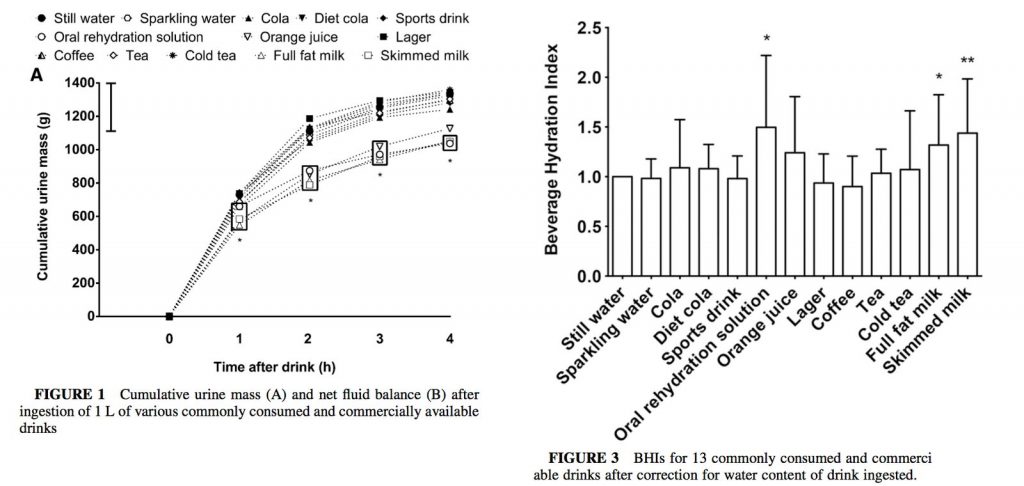10 May Does coffee dehydrate you in Ramadan?
Like this? Share It With a Friend!
Does coffee dehydrate you in Ramadan? Does it make you go to the bathroom more frequently?
SUMMARY: You may have heard that coffee is a diuretic, or a substance that makes you urinate more frequently. However, research findings indicate that coffee may not increase urination for ALL coffee drinkers. In fact, your favourite sugar-free drinks like coffee and tea (in moderation) can help contribute to your fluid intake. This article shows the evidence behind this claim!
The widespread belief that “coffee makes you pee” dates back to 1928. In a historic study (1), participants did not consume any caffeine for a period of 2 months, after which they were re-introduced to caffeine. After this 2-month period of caffeine abstention, the study notes that even half a milligram of caffeine per kilogram of body mass (roughly the amount in half a cup of coffee) caused a “noticeable” increase in urination. However, the study also found that when the participants were not deprived of caffeine for 2 months (eg. regular coffee drinkers), they built up a tolerance for coffee. These “coffee-tolerant” participants required significantly more caffeine before experiencing any noticeable increase in urination.
An updated study in 2005 (2) by Dr. Lawrence Armstrong, Ph.D., a professor in the Department of Kinesiology at the University of Connecticut, further questioned the age-old belief that coffee is dehydrating.
In this study, participants first had a base level of coffee established at 3mg per kilogram of body mass (participants were tolerant to drinking two to three cups of coffee per day, as many coffee drinkers are). Then, for 5 days, participants drank either zero, low (one cup) or moderate (two cups) levels of coffee per day. Results indicated that body mass, urine osmolality, urine specific gravity, urine color, and 24-h urine volume were all unaffected by different caffeine doses for regular coffee drinkers.
The researchers concluded, “These findings question the widely accepted notion that caffeine consumption acts chronically as a diuretic.” (2)
Another study from 2014 entitled “No Evidence of Dehydration with Moderate Daily Coffee Intake: A Counterbalanced Cross-Over Study in a Free-Living Population” (6) further supports these findings. Researchers compared 50 male coffee drinkers (who regularly drank 3-6 cups of coffee per day) drinking either coffee 4 times per day, or water. Total body water (TBW) was calculated for both groups. The study found no significant increase in total body water produced between the coffee drinkers and water drinkers.
Researchers similarly concluded, “These data suggest that coffee, when consumed in moderation by caffeine habituated males provides similar hydrating qualities to water.” (6)
This research indicates that if you already drink a moderate amount of coffee every day, your body may have developed a tolerance to the diuretic effect. In which case, you may continue to moderately drink your coffee during Ramadan without experiencing any increased urination.
Can coffee help keep you hydrated? Does coffee count towards your 6-8 cups of water per day?
Dr. Lawrence Armstrong from the University of Connecticut is a senior researcher and has conducted many peer-reviewed studies on the effects of caffeine on the body. Dr. Armstrong argues that “Caffeinated fluids contribute to the daily human water requirement in a manner similar to pure water.” (5)
The American Journal of Clinical Nutrition conducted a study (3) in 2016 to assess the potential of different beverages to affect hydration status and published The Beverage Hydration Index.
The Beverage Hydration Index (3) ranks beverages according to how much fluids from the drink your body is able to retain. In other words, the BHI measures how hydrating a beverage is when you drink it.
The results of this study surprisingly found that cola, diet cola, hot tea, iced tea, coffee, lager, orange juice, sparkling water, and a sports drink were not different from the response to water ingestion in terms of urine production.
 Figure 1 and Figure 3 cited from (Maughan, R. J., et al., 2016).3
Figure 1 and Figure 3 cited from (Maughan, R. J., et al., 2016).3
In Figure 1, you can see that urine mass after drinking coffee and tea closely resembles the urine mass after consuming still water! Figure 3 plots the Beverage Hydration Index (BHI). Notice the BHI value of coffee is very similar to the BHI value of water. Interestingly, skimmed milk and full-fat milk actually had a higher BHI and fluid retention than water:
There are several elements of a beverage that might affect fluid balance in the hours after ingestion: the macronutrient content, the electrolyte (primarily sodium and potassium) content, and the presence of diuretic agents (primarily caffeine and alcohol). Ingested drinks with a high energy content, whether in the form of carbohydrate, fat, protein, or alcohol, will empty from the stomach more slowly than energy-free drinks and will thus potentially reduce or delay the diuresis that follows in comparison with the ingestion of a bolus of still water (11, 18).3
Does coffee with milk (eg. Dhood Patti) make your coffee more hydrating? Further research is required to fully answer this question. However, the higher energy content from milk is beneficial for your body (unless, of course, you are loading your coffee with sugar).
The bottom line is that if you struggle to stay hydrated in Ramadan, your favourite sugar-free drinks like coffee and tea (in moderation) can help contribute to your fluid intake in an effortless way. For more on hydration guidelines and fluid-filled foods including 30 Dietitian-approved digestive soup recipes, consider purchasing our Ramadan Reset eBook: EVERYTHING you need to know about Healthy Eating & Exercise in Ramadan.
The Ramadan Reset eBook is your complete solution to healthy eating, exercise, sleep, coffee and so much more in Ramadan! With 90 dietitian-created recipes, full fasting fitness schedules for ALL levels, your Ramadan will never be the same! Click HERE to learn more!
References
- Eddy, N. B., & Downs, A. W. (1928). Tolerance and cross-tolerance in the human subject to the diuretic effect of caffeine, theobromine and theophylline. Journal of Pharmacology and Experimental Therapeutics, 33(2), 167-174.
- Armstrong, L. E., Pumerantz, A. C., Roti, M. W., Judelson, D. A., Watson, G., Dias, J. C., … & Kellogg, M. (2005). Fluid, electrolyte, and renal indices of hydration during 11 days of controlled caffeine consumption. International journal of sport nutrition and exercise metabolism, 15(3), 252-265.
- Maughan, R. J., Watson, P., Cordery, P. A., Walsh, N. P., Oliver, S. J., Dolci, A., … & Galloway, S. D. (2016). A randomized trial to assess the potential of different beverages to affect hydration status: development of a beverage hydration index. The American journal of clinical nutrition, 103(3), 717-723.
- Mayo Clinic Staff. (2017, April 14). Caffeine content for coffee, tea, soda and more. Retrieved from http://www.mayoclinic.org/
- Armstrong LE, Casa DJ, Maresh CM, Gaino MS. Caffeine, fluid-electrolyte balance, temperature regulation, and exercise-heat tolerance. Exerc Sport Sci Rev, 2007;35(3):135-40.
- Killer, S. C., Blannin, A. K., & Jeukendrup, A. E. (2014). No evidence of dehydration with moderate daily coffee intake: a counterbalanced cross-over study in a free-living population. PloS one, 9(1), e84154.
- Passmore, A. P., Kondowe, G. B., & Johnston, G. D. (1987). Renal and cardiovascular effects of caffeine: a dose–response study. Clinical science, 72(6), 749-756.
- Lindmier C. (2015, March 4). WHO calls on countries to reduce sugars intake among adults and children. Retrieved from http://www.who.int/
[/vc_column_text][/vc_column][/vc_row]






No Comments